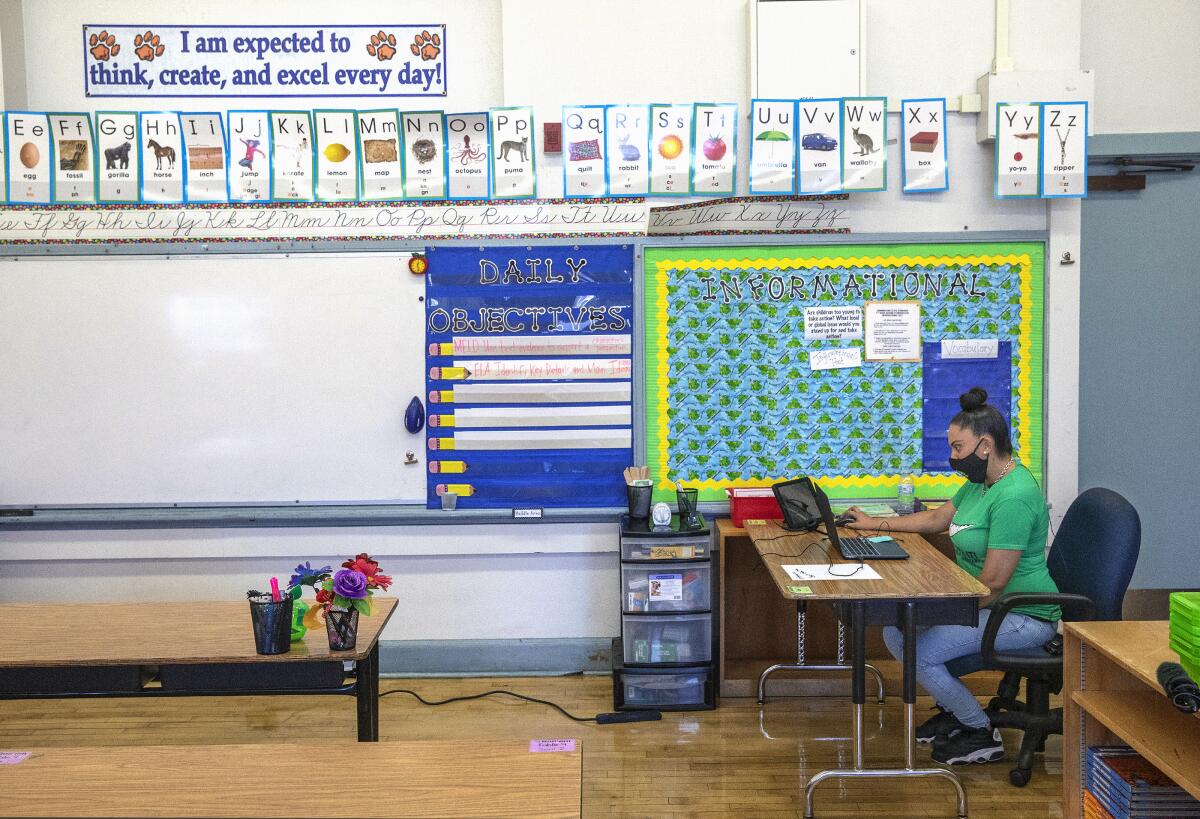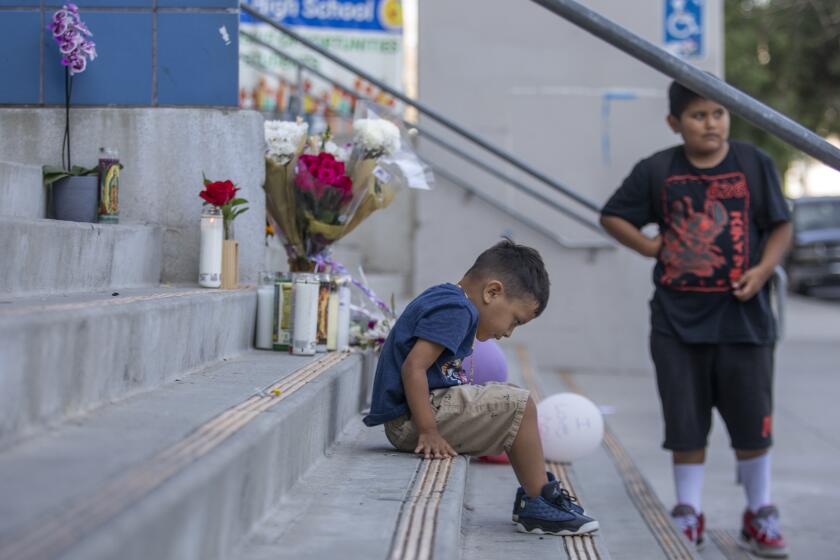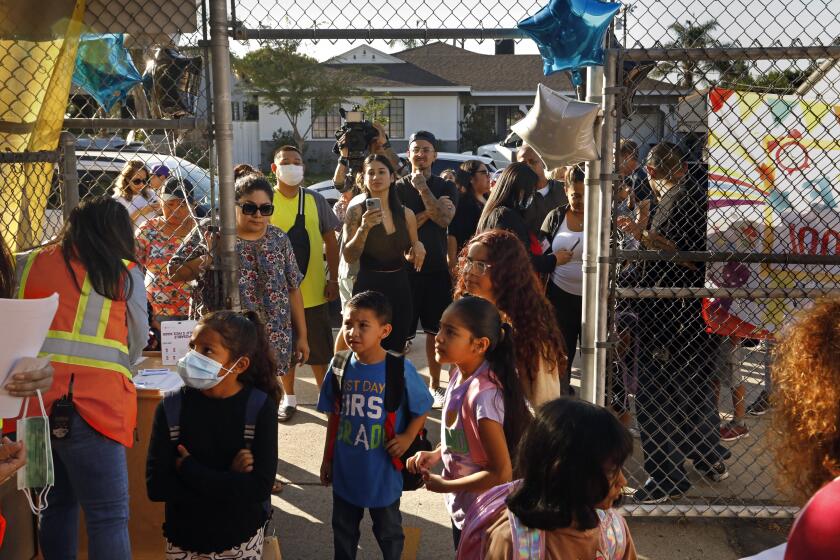Commentary: A ‘no screens’ parenting style can’t exist in a post-COVID world

“Don’t worry Daddy, I deleted my history.”
With two digital-native sons on the cusp of adolescence, I struggle to think of a more unsettling utterance than this. And recently, it came out of the mouth of one of my 10-year-olds.
He was telling me how he and his friends play on their school-issued laptops. I reminded him there was no such thing as true internet privacy, especially on a machine owned by someone else (and probably loaded with spyware).
My next-door neighbor, also a fortysomething parent of young children, was with me and cackled when he heard my son’s comment. I could only think, “Those damn laptops.”
Those damn laptops — it’s something my wife and I have said a lot since the spring of 2020, when our school district issued Google Chromebooks to every student. The urgency was clear: Kids of varied economic circumstances needed access to technology to continue learning, and inexpensive laptops helped achieve that.
Children are being poisoned by fentanyl, a deadly opioid. Here’s how a family therapist suggests telling kids about it.
Never mind what experts had drummed into the heads of parents that children needed strict limits on their screen time. That went not just for video games or TV, but also anything “educational” that wasn’t in real life or on paper. Lazy parents left the TV on during Shark Week; the good ones took their kids to the Tar Pits.
Pre-pandemic, the thought of giving my 8-year-old twins (second-graders in 2020) their own Wi-Fi-enabled laptops was a nonstarter. But the onset of COVID-19 altered priorities, and appropriately so. We were protectors first and foremost against a deadly disease — and screen time meant the difference between some education and none.
When our 4-year-old started transitional kindergarten that fall, he too got a laptop (watching his teacher hold the attention of kids that young over Zoom seemed miraculous). By late 2020, all three of our children had their own password-protected devices. Thus, we parents transitioned from fearing screen time as detrimental to children’s brain development to accepting it as necessary to their education and growth.
This situation is now permanent, even with in-person classroom instruction. The centrality of their laptops to their education remains. The two fourth-graders do their homework on the computers; mercifully, the first-grader leaves his laptop on campus.
I say mercifully because his older brothers have become adept at logging on the moment my wife and I look away. Often, our only indication of surreptitious browsing comes from the 7-year-old whining, “They get computers and I don’t!”
I had always envisioned this transition taking place more slowly, and wholly on our terms — perhaps with a formal handover of a smartphone, or by introducing a shared laptop for the whole household. But 2020 changed the world for everyone, us included. Conversations we thought we’d be having now — about social media, online bullying and misinformation — started a year or two earlier.
Classroom COVID rules are gone, and yet we’re now starting to grapple with the prevalence and severity of long COVID.
The unalterable truth, however, is that the pandemic only hastened this endless connectedness for children. That’s the reality, and if I don’t like it … well, there’s no use even admitting the dislike. I ignore it like a well-trained dog ignores the mailman despite every instinct in his body telling him to do something.
But I have learned a few things. Telling my children “no screens” doesn’t work. So now, I’m more inclined to take my children away from their screens than take their screens away from them — by getting them outside as much as possible. We take drives on Angeles Crest Highway and explore gorgeous mountain trails that most lifelong Angelenos sadly never see. We’ve gone to the beach on cold days. We’ve watched planes take off and land near an LAX runway.
With two working parents, this isn’t always possible. So if I can’t beat ‘em, I join ‘em — by bringing my own employer-issued laptop and sitting with them as they play on theirs. I might not like what they’re doing, but it helps to be there while they’re doing it. Sometimes they even talk to me about it.
Resigned as I am to this reality, giving laptops to all children still feels like an unplanned, mass experiment.
A screen for every child, even little ones, was a terrible idea until it wasn’t. I can only hope my kids adjust their online behavior if their grades slip or they encounter other problems. But in the meantime — in the spirit of internet crowdsourcing for a solution — I’m eager to learn how other parents or guardians have handled this change.
Have ideas or strategies? I’m all ears.
More to Read
A cure for the common opinion
Get thought-provoking perspectives with our weekly newsletter.
You may occasionally receive promotional content from the Los Angeles Times.













